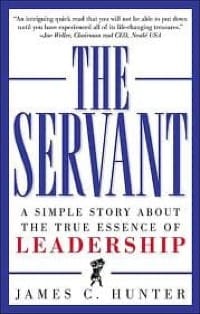New Book Review: "The Servant"
New book review for The Servant: A Simple Story About the True Essence of Leadership, by James C. Hunter, Prima, 1998:


Recently recommended by the instructor of a University of Illinois leadership training course my colleagues and I attended, this book is one of the best leadership texts I have read during my career. Although readers may be initially drawn to this text for the lessons in leadership it provides for the business world, what Hunter presents here is intended to be holistic, covering relationships both inside and outside the workplace. In the words of the author, at the time of writing a general manager of a large manufacturing facility, his life was falling apart at home and work, and after discussions with his wife and reluctant talks with his pastor, ended up spending a week at a monastery in northwestern Michigan "to sort things out". While financially successful, his wife made it clear there were issues with the dynamics between he and his family, and his human resources manager suggested that he take a look at his leadership style after employees campaigned for union representation.
In sharing his experience at the monastery, Hunter tells a good story and masterfully weaves in the principles he learns discussing leadership with several other individuals, including the former CEO of an airline turned monk who led the discussions, a drill sergeant, a public school principal, and a women's basketball coach. The teacher first discusses the differences between leadership and management, and power and authority, and then presents the pyramid style of management paradigm and how it came to be so popular in the United States, followed by Maslow's hierarchy of human needs with which many readers will already be familiar, and the servant leadership model which he discusses one element at a time and that serves as the focal point throughout the remainder of the book. The simple explanations of sometimes weighty topics, classroom dynamics between individuals of varied backgrounds, and author vulnerability are what makes this book work. The ninety other consistently positive reviews here that stretch over a ten-year period are a testament to the effectiveness of what Hunter, at the time of publication a consultant at a labor relations and training consulting firm, has to share with readers in this quick, but engaging text.